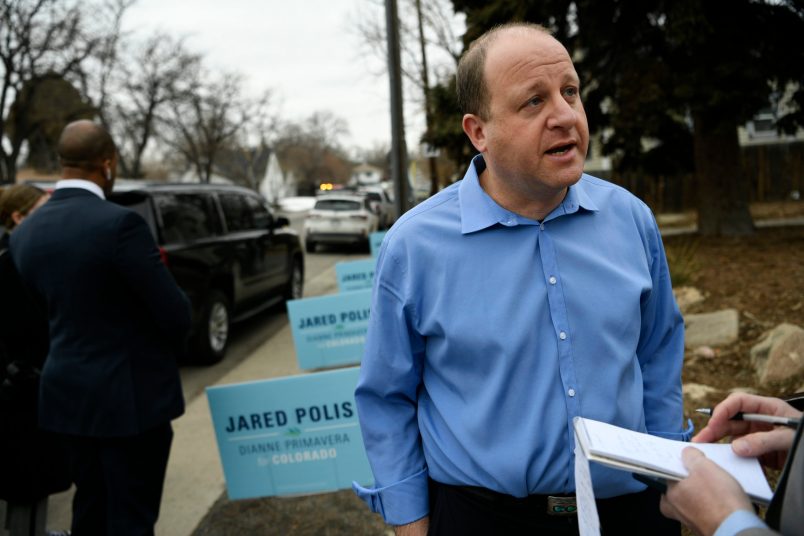Colorado Gov. Jared Polis — a Democrat up for reelection — signed an executive order this week that will, essentially, protect Colorado from having to cooperate with other states’ investigations into people seeking or providing abortions.
Polis’ executive order states that Colorado will not help out with any criminal investigations or civil actions that originate in other states that are aimed at curbing access to abortion or punishing those involved in the procedure. Here’s the language of that part of the order, it’s seems rather sweeping:
“All state agencies and principal departments shall not, unless pursuant to a court order, provide information or data, including patient medical records, patient-level data, or related billing information, or expend time, money, facilities, property, equipment, personnel, or other resources to assist or further any investigation or proceeding initiated in or by another state that seeks to impose criminal or civil liability or professional sanction upon a person or entity for conduct that would be legal in Colorado related to providing, assisting, seeking, or obtaining reproductive health care.”
Polis also ordered the state Department of Regulatory Affairs to put measures in place to protect anyone who holds a Colorado professional license from “disciplinary action against a professional license or disqualified from professional licensure” for performing or seeking abortion care in any state.
“I will exercise the full extent of my discretion to decline requests for the arrest, surrender, or extradition of any person charged with a criminal violation of a law of another state where the violation alleged involves the provision of, assistance with, securing of, or receipt of reproductive health care, unless the acts forming the basis of the prosecution of the crime charged would also constitute a criminal offense under Colorado law,” Polis wrote in the order.
It’s not the first action Colorado has taken to shore up abortion rights in the state in the wake of Roe’s demise. Polis signed a bill into law earlier this year that protected access to abortion and contraceptives in the state.
The governor said in a statement that the executive action was in part a reaction to the uptick in states not just passing abortion bans and restrictions after the Supreme Court overturned Roe, but also a response to the swelling threat of lawmakers in red states attempting to introduce legislation that’d allow them to police abortion action across state lines.
Polis’ state lines language is similar to the language of a law Connecticut lawmakers passed earlier this year that will protect Connecticut people seeking and performing abortions from being charged for the procedure in other states.
Basically since oral arguments on Dobbs in December — when conservative justices signaled they weren’t going to waste any time in overturning Roe — blue states across the nation have been making moves to codify abortion rights into state law, with some moving to enshrine the right in state constitutions if it wasn’t protected there already. But we haven’t yet seen a groundswell of actions on par with Colorado’s and Connecticut’s efforts to block the state-line policing.
It’s an issue TPM has been covering for a while. My colleague Kate Riga wrote about the emerging trend back in March, before Roe was overturned and just before the draft majority opinion was leaked. At the time, experts told TPM they’d long anticipated this next move on the anti-abortion front, predicting rather accurately that once Roe was overturned, anti-abortion advocates and politicians wouldn’t be content with a nation simply divided by bans and safe havens.
In a bleakly small bright spot in the majority’s opinion to end the constitutional right to an abortion, Supreme Court Justice Brett Kavanaugh quietly signaled in his concurrence that he would support the constitutional right to travel across state lines to seek abortion care.
“Some of the other abortion-related legal questions raised by today’s decision are not especially difficult as a constitutional matter,” Kavanaugh wrote. “For example, may a State bar a resident of that State from traveling to another State to obtain an abortion? In my view, the answer is no based on the constitutional right to interstate travel.”
But, as we know, Kavanaugh’s not one to stick to his word.
The Best Of TPM Today
Here’s what you should read this evening:
The latest on the filibuster carve out for abortion front: Casey Supports Reforming Filibuster To Pass Abortion Protections
And: Feinstein Will Vote For Filibuster Reform To Pass Abortion Protections
In Michigan GOP forgery scandal news today: Michigan GOP Guv Candidates Try To Out-Trump Each Other In Debate
And: GOP Candidate For MI Guv Pleads Not Guilty To Jan 6-Related Charges
Glad that’s “””cleared up”””: GOP Rep. Lesko Tries To Clean Up That Weird Remark About Shooting Her Grandkids
Potential Mass Shooting On July 4 Prevented By Tipster, Police Say
From ProPublica: Ken Griffin Spent $54 Million Fighting A Tax Increase For The Rich. Secret IRS Data Shows It Paid Off For Him.
Comey And McCabe Just Happened To Get Same Rare Intensive IRS Audits Under Trump Appointee
Yesterday’s Most Read Story
What Lindsey Graham Did In Georgia To Keep Trump In Power — Josh Kovensky
What We Are Reading
It’s Time to Stop Living the American Scam — Tim Kreider
Roy Moore loses appeal in $95 million lawsuit against Sacha Baron Cohen — Paul Gattis
Chauvin sentenced to 20 years for violating Floyd’s federal civil rights — Holly Bailey


